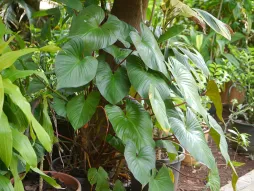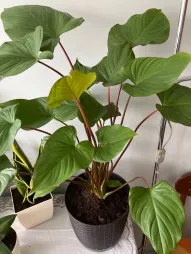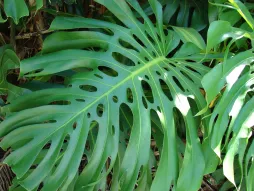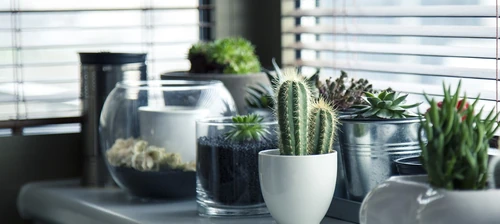Homalomena 'Lemon Lime', tangy foliage
Not all queens of heart wear red! Take Homalomena 'Lemon Lime', for example. This variety of Homalomena rubescens is distinguished by its light green leaves, stems and petioles.
How to recognize Homalomena 'Lemon Lime'?
Homalomena 'Lemon Lime' is an upright, compact perennial. It can reach a meter in height with a 60-centimeter spread.
Like other Homalomena rubescens, the plant grows from a thin, brown rhizome. But while other varieties, such as homalomena 'Maggy, have red stems and petioles, those of Homalomena 'Lemon Lime' are green.
The leaves are also green. The foliage is a light green tending to yellow, reminiscent of citrus fruits. The heart-shaped blades measure up to 35 centimetres long and 25 centimetres wide. Their pronounced veins give the leaves a waffle-like appearance.
Homalomena 'Lemon Lime' sometimes flowers. But you'll need to be careful to watch it bloom! The inflorescence is no more than five centimetres long and appears at the foot of the plant. It consists of a spathe and a spadix.
Some people claim that Homalomena 'Lemon Lime' has depolluting properties. However, one thing is certain: the plant is toxic to humans and animals. It causes digestive problems when ingested and skin irritation when its sap comes into contact with the skin.
Our maintenance tips
Don't know when to water your Homalomena rubescens ‘Lemon Lime’? Watch your plant! When it's thirsty, the stems and leaves droop. You need to water it right away.
Watering
Water only when the substrate has dried on the surface (one or two centimeters).
Use non-calcareous water, such as rainwater or mineral water, at room temperature. Pour it over the soil, avoiding the foliage.
To prevent root rot, remove any water that collects in the dish or planter.
Spray
Spray foliage with water at room temperature. Do not use tap water. It is often too hard and leaves marks on the leaves.
Fogging temporarily increases humidity and combats the appearance of parasites.
Repotting
In spring, transfer your Homalomena rubescens ‘Lemon Lime’ to a larger pot, so that it can continue to grow.
Choose a pierced pot one size larger than the previous one. Line the bottom with a drainage layer. You can make a bed of clay balls or gravel.
Homalomena 'Lemon Lime require rich, well-drained soil. You can use potting soil for green plants with perlite. After covering the drainage layer with this mixture, plant your subject in the center of the pot. Add substrate and tamp down.
Water to encourage rooting.
Fertilization
You can stimulate the development of your plant during its growth phase, in spring and summer, with fertilizer.
Apply a liquid fertilizer for green plants to stimulate growth.
Cleaning
Place your Homalomena 'Lemon Lime' in its pot in the shower or bathtub. Turn the tap on to warm water and water the foliage.
The water removes dust and eliminates certain pests. The shower also helps to temporarily increase humidity.
Prune
To encourage the growth of your Homalomena 'Lemon Lime', prune regularly.
You can remove the yellowed leaves.
Cutting
Cutting is carried out during the strong growth phase, generally in spring and early summer.
Carefully dig up your Homalomena 'Lemon Lime'. Locate a rhizome with at least two or three shoots. Separate it from the mother plant with a clean, sharp knife or pruning shears. Remove leaves, rhizome and roots.
Choose a pierced pot of a size suited to your cutting. For example, for a plant with four or five leaves, choose a fourteen-centimeter diameter pot.
Prepare a mixture of green potting soil (90%) and perlite (10%). Fill the bottom of the pot with a layer of substrate. Plant your homalomena 'Lemon Lime in the center and add potting soil.
Water generously and place your cutting in partial shade.
Information
| Family | Araceae - Araceae |
| Type | Homalomena - Homalomena |
| Species | Homalomena rubescens - Homalomena rubescens |
| Lifecycle | Perennial |
| Foliage | Evergreen |
| Exposures | |
| Substrat | |
| Planting methods |
In pots In tubs |
| Categories | |
| Tag |
Fritillary |
| Origin |
Southeast Asia |
| Hardiness (USDA) | 11b |
| Leaf color |
|
Discover plants from the same family

Homalomena rubescens
Discover

Homalomena 'Maggy
Discover

Monstera deliciosa
Discover

Monstera variegata
Discover














